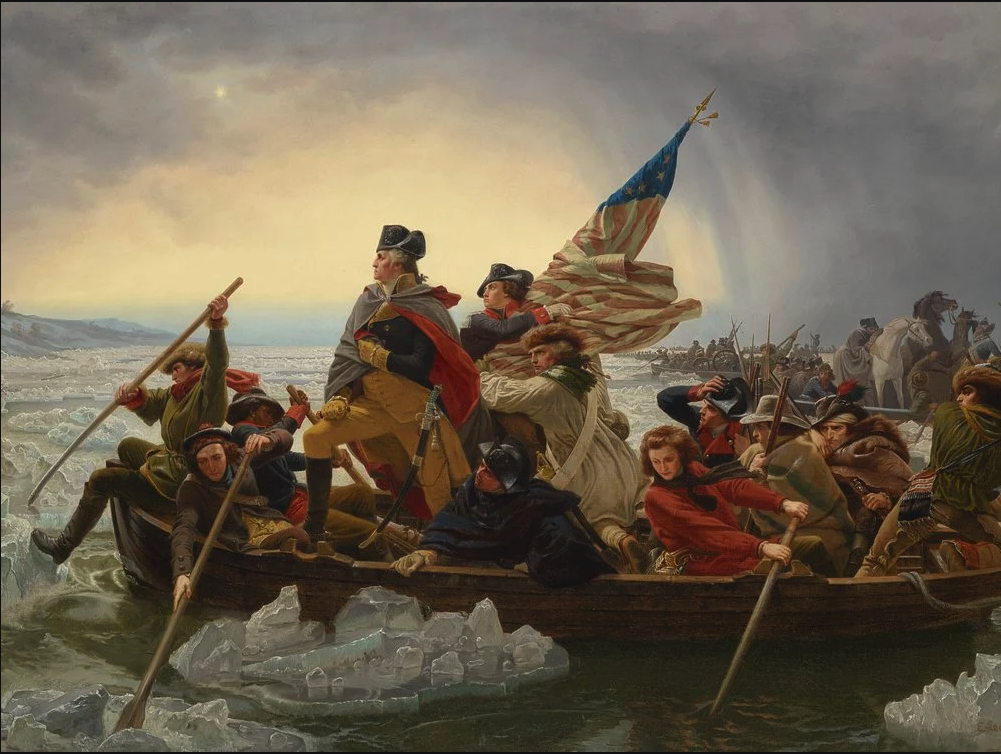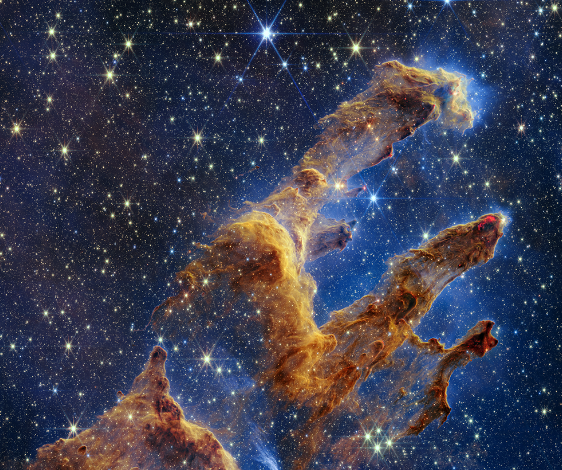“And for the support of this Declaration, with a firm reliance on the protection of Divine Providence, we mutually pledge to each other our Lives, our Fortunes, and our sacred Honor.”
― Thomas Jefferson, The Declaration of Independence

Painted by Emanuel Leutze to inspire a sense of patriotism among 19th-century Americans, Washington Crossing the Delaware still has cultural sticking power today: NAJ screen shot
The Big Picture –
By Glynn Wilson –
WASHINGTON, D.C. — From the very beginning of this brave new experiment in government by the people we seemed to want to rely on some form of Divine Providence for our ultimate success.
Even if there is such a thing, and it is highly doubtful, it appears now to be leaving us abandoned and alone on this lonely planet, where we are as divided about what that even means as we are about which party is more likely to save us from our own selfish destruction. We can’t even agree that we need to borrow more money to keep funding this experiment. Some seem content to leave our fate in the hands of this Divine Providence, even though even Jesus supposedly said, “God helps those who help themselves.”
To get a glimpse of what I mean look no further than Wyoming, where Republican Susan Stubson writes about the destructive rise of Christian nationalism — the belief, as recently described by the Georgetown University professor and author Paul D. Miller, that “America is a ‘Christian nation’ and that the government should keep it that way.”
“Gone are the days when a lawmaker might be circumspect about using his or her faith as a vehicle to garner votes,” she says, talking about the time gone by when even the Southern Baptists were strong believers in the separation of church and state outlined in the First Amendment to the U.S. Constitution.
“It’s been a drastic and destructive departure from the boring, substantive lawmaking to which I was accustomed,” she says. “Christian nationalists have hijacked both my Republican Party and my faith community by blurring the lines between church and government — and in the process rebranding our state’s identity.”
What Christian Nationalism Has Done to My State and My Faith Is a Sin
In theology, Divine Providence, or simply Providence, is defined as God’s intervention in the Universe. The term Divine Providence (usually capitalized) is also used as a title of God. A distinction is usually made between “general providence”, which refers to God’s continuous upholding of the existence and natural order of the Universe, and “special providence”, which refers to God’s extraordinary intervention in the life of people. Miracles generally fall in the latter category, at least according to Wikipedia.
Etymology
“Divine” evolved in the late 14th century to mean “pertaining to, in the nature of or proceeding from God or a god.” This came from the Old French devin or devin, with a similar meaning, and that from the Latin divinus, meaning “of a god”, in turn from divus, with similar meaning, which was related the Latin deus, meaning god or deity. The word providence comes from Latin providentia meaning foresight or prudence, and that in turn from pro-, ahead” and videre, to see. The current use of the word in the secular sense refers to foresight, or “timely preparation for eventualities”, or (if one is a deist or an atheist) “nature as providing protective care.”
The term Divine Providence was not only used by Thomas Jefferson in the Declaration of Independence. It was often cited by George Washington as well. I know quoting the founding fathers these days is less than politically correct, but I can’t help myself.
“The Man must be bad indeed who can look upon the events of the American Revolution without feeling the warmest gratitude towards the great Author of the Universe whose divine interposition was so frequently manifested in our behalf,” Washington wrote in a letter to Samuel Langdon on September 28, 1789.
It must have seemed like Divine Providence to Washington who should have lost his army and the Revolutionary War on multiple occasions, only to somehow survive to fight another day and ultimately win a war that appeared unwinnable, like that fateful Christmas Night in 1776 when General Washington led 2,400 hungry, ramshackle soldiers across the half-frozen Delaware river in the midst of a storm to mount a surprise attack on Hessian forces in Trenton, New Jersey. It marked a crucial turning point in the Revolutionary War, proving that the underfunded, scrappy Continental army was capable of winning — and became the stuff of American legend, in part due to “Washington Crossing the Delaware,” a monumental painting by German American artist Emanuel Leutze, according to Smithsonian Magazine.
Veering from the Enlightenment’s deistic view of God as uninvolved in the world, many early Americans’ recognized a biblical God or “Divine Providence” who intervenes in the lives, events, and affairs of men. In the midst of a fallen world corrupted by sin, this God supposedly cares for and guides people by His wisdom and love and for His divine purpose, all evidence to the contrary.
What does this so-called divine providence have to say about Vladimir Putin and his ruthless attack on Ukraine, or the lying lies of Donald Trump? Wouldn’t a just God strike them both down with a bolt of lightening, in Trump’s case on the 18th green one stormy Monday at Mar-a-Lago?
What of all the hunger and painful suffering in the world, the poverty and discrimination?
This perspective was acknowledged by the early church, Augustine, Thomas Aquinas, reformers Martin Luther and John Calvin, and the colonial American Puritans and Awakeners, at least according to some who promote this optimistic view of the world.
In 1785, James Madison argued against the state support for churches, however, writing a Memorial and Remonstrance that when religious and civil power were intertwined, “What have been its fruits?” Madison asked. “More or less in all places, pride and indolence in the clergy, ignorance and servility in the laity; in both, superstition, bigotry and persecution.”
This is certainly no less true today.
After all, even if you believe in some form of Christianity or Catholicism, which kind? That of the U.S. Supreme Court, with six Catholic justices? Or the version practiced by the President of the United States himself, Joe Biden, who takes a more liberal view?
Discussing the ongoing debate over raising the debt ceiling, which is about to crash Congress and force the country into a recession — which could very well lead to a global depression from which we may never escape again — Biden suggested, and rightly so, that some Republicans were trying to crash the economy by not raising the borrowing limit, in order to hurt Biden’s hopes of winning re-election. If the nation were to default, Biden said, “I would be blameless” on the merits — meaning that it would be Republicans’ fault.”
But, he said, “on the politics of it, no one would be blameless. I think there are some MAGA Republicans in the House who know the damage that it would do to the economy, and because I am president, and the president’s responsible for everything, Biden would take the blame.”
Biden and McCarthy Set to Resume Negotiations on Debt Limit
The right’s contention that we are a “Christian nation” that has fallen from pure origins and can achieve redemption by some kind of return to Christian values is based on wishful thinking, not convincing historical argument. Writing to the Hebrew Congregation in Newport, Rhode Island, in 1790, President Washington assured his Jewish countrymen that America “gives…bigotry no sanction.” In a treaty with the Muslim nation of Tripoli initiated by Washington, completed by John Adams, and ratified by the Senate in 1797, the Founders declared that “the government of the United States is not in any sense founded on the Christian Religion….”
Yet old Judge Roy Moore down in Alabama still insists that the only thing that can save America is to put God back on top over government, even though it was never intended that way by those who risked their lives to create this country out of a corrupt monarchy.

The Pillars of Creation are set off in a kaleidoscope of color in NASA’s James Webb Space Telescope’s near-infrared-light view. The pillars look like arches and spires rising out of a desert landscape, but are filled with semi-transparent gas and dust. This is a region where young stars are forming – or have barely burst from their dusty cocoons as they continue to form: NASA
If there is some Divine Providence somewhere out there in the universe hiding behind the Pillars of Creation — or a more advanced form of life from a more altruistic species than us — now would be the time to intervene in the affairs of blind, stupid, selfish men. Heed the prayers of the multitudes and save us from ourselves.
If you do nothing, as usual, dog help us. I’m almost done with trying. The rest will be up to you all.
___
If you support truth in reporting with no paywall, and fearless writing with no popup ads or sponsored content, consider making a contribution today with GoFundMe or Patreon or PayPal.














This about sums up the exposure of all the “lies” funded and promoted by WEALTH to justify their monied investment in acolytes for whom we are forced to vote.
In 1785, James Madison argued against the state support for churches, however, writing a Memorial and Remonstrance that when religious and civil power were intertwined, “What have been its fruits?” Madison asked. “More or less in all places, pride and indolence in the clergy, ignorance and servility in the laity; in both, superstition, bigotry and persecution.”
This is certainly no less true today.
After all, even if you believe in some form of Christianity or Catholicism, which kind? That of the U.S. Supreme Court, with six Catholic justices? Or the version practiced by President of the United States himself, Joe Biden, who takes a more liberal view?